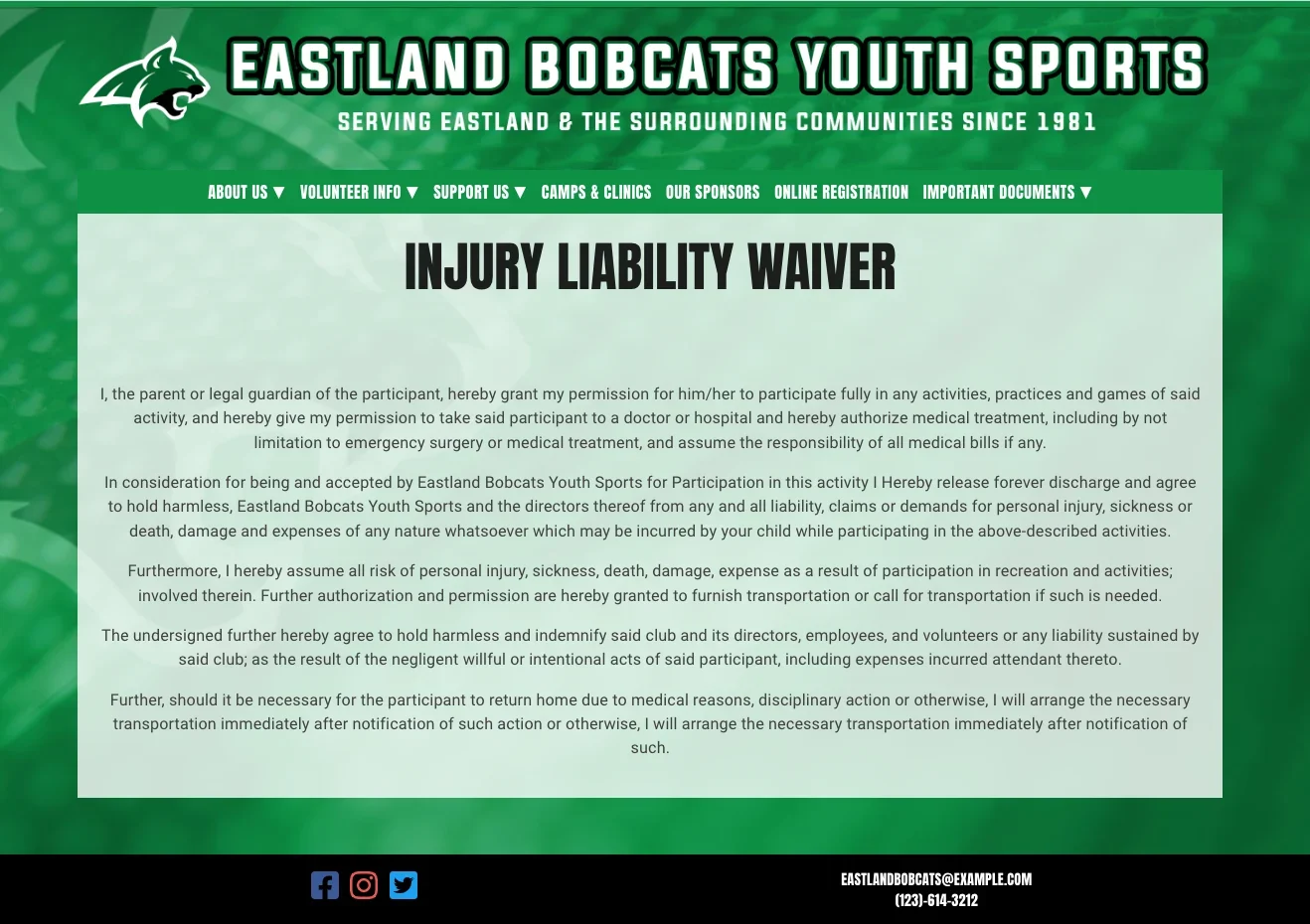
Part of running a smooth youth sports organization is ensuring everyone knows and follows the rules. And one great way to make sure everyone participating—coaches, parents, and players alike—understands them is through a youth sports contract.
A youth sports contract is a signed document that walks participants through what is expected of them throughout the season. Of course, contracts signed by minors aren’t actually legally binding, but these can still play a big part in good sportsmanship.
Learn more about why you might want to use youth sports contracts in your organization, types of contracts you can use, and how to create and implement your own.
What are youth sports contracts?
Youth sports contracts are documents you have participants sign that explain what is expected of them throughout the season. What these contracts look like will depend on who is signing and what information is pertinent.

Source: Pexels
For example, a coaching agreement will look different than a player participation agreement. But in general, you’ll see information like the following in a youth sports contract:
- Pledge
- Organization rules and policies
There may be other league or sport-specific information included within the contract as well. But, youth sports contracts are typically a single-page document that helps make sure all participants are on the same page and promise to follow along with the rules.
Types of contracts in youth sports
Now let’s talk about different types of contracts you might come across or create in a youth sports league.
Player participation agreements
Player participation agreements are between a league or team and each player. This type of contract walks players through season expectations, behavior code of conduct, and other policies they’ll need to follow throughout.
For example, this might include information like how many practices players are allowed to miss without losing play time or rules regarding safety for different positions.
Players will read and sign the participation agreement, signaling that they understand the rules and know how to conduct themselves throughout the season. The contract should also include consequences that players may face if they’re consistently ignoring their signed agreement.
Liability waivers and release forms
Liability waivers and release forms should be signed by parents to help release the youth sports program from being responsible for potential injuries.

The point of this type of form is to ensure the league (which is likely made up of volunteers and funded solely through registration fees and fundraisers) can’t be sued for player injuries and to keep parents and players informed of the potential risks of the sports environment.
You might also include release forms so that your league can take and post photos of the players on the league’s website. This way, parents can opt in or out of their child being in public-facing team photos.
Code of conduct agreements for players and parents
Code of conduct agreements can be for players only, or for parents as well. Many parents become impassioned during their kids' games, so a code of conduct agreement can be a good reminder of how they should behave.
The same goes for the players—sharing important sportsmanship guidelines, discussing overall rules of the game, expectations, accepted behavior, and more.
Coaching contracts and agreements
Coaching contracts are between the coaches and the league organization. This type of agreement is to ensure coaches hold up their end of the bargain—coaching a youth sports team throughout the entire season.
Coaching agreements can also include details like how many practices they’re allowed to have each week, how much play time each child should get, and more.
Sponsorship agreements
This is one of the most important types of contracts because you actually need to outline specifics regarding deliverables on your end and payment terms on the sponsor’s end. Each time you sign a new sponsor, make sure a contract is a key part of the transaction.
Key elements of an effective youth sports contract
Want to create an effective youth sports contract? Of course, no league plans to actually hold these contracts up in court. But having players, parents, and coaches sign an effective and well-written contract can help guide expectations throughout the season.
Clarity and specificity
Every good contract uses clear language and specific terms. There should be no nuance or uncertainty with the way your contract is written. Let signers know exactly what is expected of them so they can sign with 100% clarity and understanding.
Enforceability and legal considerations
Again. It’s likely no league is planning to take a player, parent, or coach to court over this contract. (Especially because minors cannot be legally bound by a contract.) Instead, it should outline what the consequences are for not following the rules—i.e., getting kicked out of games or losing playing time.
However, contracts should still be written in a way that’s enforceable, especially when the league is working with coaches and outside vendors. Be sure to have a lawyer look your contracts over or help write them up to ensure they’re enforceable in court.
Inclusion of essential terms
Finally, you need to identify must-have clauses for your youth sports contracts. What sections are essential to your league’s needs?
For player contracts, those might look like:
- Tryout details
- Training expectations
- Performance expectations
- Expectations of respect (for team, coaches, and equipment)
- Behavior expectations
- Safety expectations
For parent contracts, you might include:
- Policies
- Code of conduct at youth sporting events
- Consequences
For coach contracts, this essential terms may include:
- Length of obligation
- Terms of obligation
- Equal opportunity guidelines
- Compensation (if any)
And for sponsorship contracts, you might need terms like:
- Length of sponsorship
- Sponsorship deliverables
- Sponsorship costs
- Payment terms
Drafting a youth sports contract
You want your youth sports contracts to help facilitate a healthy environment and improve the youth sports experience, so you need to take care as you draft them up. Keep these best practices and pitfalls in mind as you write out each of your contracts.
Best practices
Keep these best practices in mind as you write up contracts for your league participants:
- Be clear and concise in your language
- Regularly review and update your contracts
- Make sure you know exactly what’s in each contract
- Create processes around distributing and signing contracts
- Organize contracts so you have all the season’s contracts in an easy-to-access area
- Have a professional writer or even a lawyer help draft your contracts
- Make sure all signees include their name and date of birth when signing
Pitfalls to avoid
Don’t fall victim to these issues when drafting up your contracts:
- Avoid jargon and complex terminology, especially for young athletes
- Don’t be vague in your wording
- Proofread each contract to ensure there are no typos or grammatical errors
- Don’t use superfluous language that makes your contract difficult to understand
- Avoid outrageous terms and conditions that keep people from signing or participating in your league
- Don’t forget to address a time frame or termination date for your contract
Implementing contracts in your sports program
Interested in implementing contracts to improve teamwork and sportsmanship across all age groups? Use these three tips to help you get started.

Communication with stakeholders
Plan to start using contracts at the start of a new season so you aren’t interrupting existing processes or teams. Assign one person working with the league organization to spearhead this new contract process.
They can start giving coaches and parents a heads up that the next season will be a bit more structured and include different contracts to improve the overall league and well-being of the players.
This person should also be well-versed in what each contract contains. This way, as they start handing them out throughout the start of the next season, they can easily walk players, parents, coaches, and anyone else, through what it says and what is required of each participant.
Managing contract acceptance and storage
Ensuring all participants sign the contracts and finding a place to store them can be difficult—especially if you choose to work with paper contracts.
If this is the case, consider uploading PDFs of your contracts onto your league’s website so that parents can print them off alongside registration forms and bring them into the league’s office. Keep a filing cabinet where you can store all of the season’s forms and contracts for easy access.
Or, go paperless. With Jersey Watch’s sports registration software, you can easily include contract forms as a part of the registration process or on other landing pages on your website. This way, parents and players can easily access the contract and sign it—then it’s stored in the cloud.
Adapting contracts for different sports
If your organization runs multiple leagues for different sports, you’ll likely want to use the bones of existing contracts rather than starting from scratch. In many cases, you can use the exact same contract across sports.
However, contracts that talk about safety specifics, equipment handling, and other sport-specific jargon, will need some updates to work from sport to sport. These changes and adaptations should easily be able to be handled in-house and shouldn’t need eyes from a lawyer to confirm.
Simply adjust sport-specific lingo in each contract and save them in organized spaces so that league volunteers and coaches can easily find them to distribute to their players.
Learn how to use youth sports contracts in your organization
Introduce youth athletes to the world of professional sports through a youth sports contract. Walk them through expected behavior, conduct, training, performance, and more.
Plus, you can keep parents accountable and ensure coaches stick to their obligations by offering additional contracts. Youth sports contracts can be useful even if you don’t plan on making them legally enforceable—simply having the terms and conditions out there can help players abide by the proper rules.
Let Jersey Watch make distributing and accepting contracts easy. Build an online home with our youth sports website builder and easily collect signed contracts without your league needing to print off and store hundreds of sheets of paper.